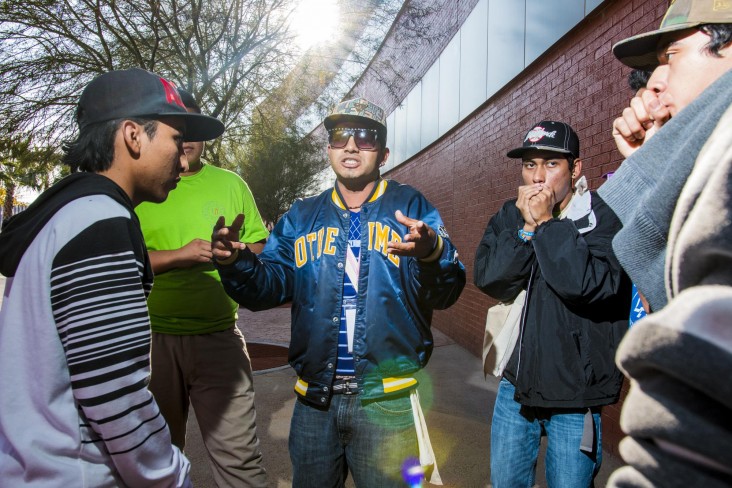
April 2016—Edgar Otero, 26, lives in Monterrey, Mexico, and his young life has been impacted by growing up in a violent home and in neighborhoods with high levels of crime and violence. He laments that he suffered physical and mental abuse from his father, who also abused his mother.
Pain hardened him at a young age and drove him away from home into the streets, where he joined gangs and became addicted to drugs.
Inspired by USAID’s Crime and Violence Prevention Program, Otero wrote a rap song about his challenges and how he turned his life around. He is proud to take center stage and share his story at program events that take place in neighborhoods severely affected by crime and violence in his hometown.
“I couldn’t accept that my family was broken. I became a criminal who could not be stopped,” he raps.
The program, which targets at-risk youth, is implemented by TetraTech and partners, including SUPERA, a Mexican NGO.
Since joining the program in August 2014, Otero is working hard to adopt a healthier lifestyle. He knows that his story is shared by many young people in his neighborhood, and he wants to generate hope so others will learn from his example. Through his songs, he eagerly shares his experience, talks about his life, and dreams of possibilities for his future.
Otero ends his song Triste Realidad on an upbeat note: “I don’t want to suffer anymore, I want to forget the pain and how those horrible drugs made me heartless. My eyes have been opened. I know that someone cares about us and will look after us. Drugs lead to sadness and pain, and now that I have learned to face my problems, I understand the mistakes I have made and am thankful that this has eliminated my suffering.”
Together with 788 young men and women ages 14 to 29 from three communities in Monterrey, Otero participated in USAID’s Youth for Equity Program. Designed by Crime and Violence Prevention Program staff, the equity program is modifying violent behavior that stems from societal notions that men should be powerful and dominate by using force and creating fear.
Traditional concepts of masculinity can contribute to the generation of violence within individuals, families and communities, affecting the security of households and public spaces. Societal norms in Mexico tend to discourage men from being caring, nonviolent and responsible partners.
Positive role models of men who embody these characteristics have been largely absent in Otero's and other young men’s lives. The concept of “new masculinity” builds on positive masculine attributes and values to encourage personal development, discourage violent behavior, and foster gender equality, collaboration and peaceful communities.
Otero’s peers Diomedes, Mario, Emir and Raymundo have also participated in the program since 2014 and share similar stories of domestic violence and dysfunctional family life. They also share a common passion for writing lyrics where they rap to express their feelings and speak out about the importance of gender equity and nonviolence.
Their new aspirations have evolved into tangible goals. The young men want to develop a rap academy to positively influence other peers and to serve as positive role models for young men and women, and promote a culture of nonviolence. They are passionate about sharing with their families and peers positive behaviors and the importance of addressing domestic and gender-based violence in their households and within their communities.
The Youth for Equity Program, which ran from June 2014 to November 2015, was designed to promote positive ways to reaffirm virility and healthy development for men while fostering gender equity through activities involving peaceful conflict resolution, emotional control, and new forms of expression. Workshops included ways to counter negative influences of the media and the perception of violence as an accepted behavior between men and women.
LINKS







Comment
Make a general inquiry or suggest an improvement.